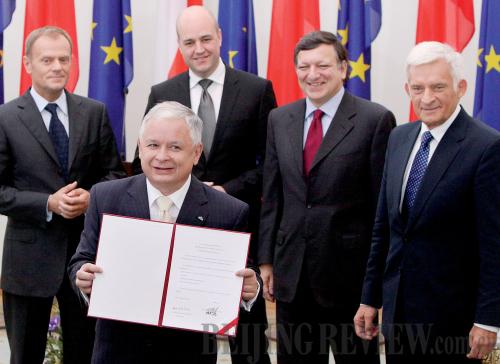|
 |
|
COURTESY OF ZHAO HUAIPU | As the Lisbon Treaty entered into force on December 1, the world is waiting to see the changes it will bring to the European Union (EU).
The Lisbon Treaty came into being based on the treaty establishing a constitution for Europe—more commonly referred to as the European Constitution.
In the early 21st century, the EU realized that its integration had arrived at a new crossroads. After 50 years of efforts, the integration had made great achievements. However, a lot of challenges stood in the way to further integration.
 |
|
A DAY TO REMEMBER: Polish President Lech Kaczynski shows the EU’s Lisbon Treaty that he had just signed as other EU leaders look on in Warsaw on October 10 | Questions included dilemmas over how the EU's governance might adapt to its expansion, especially given its organizational structure, decision-making processes and administrative systems—all far behind the requirement of effective operation in the new environment.
The long existing bureaucracy, moreover, had already created a distance between the EU and its citizens. The people were indifferent with the integration, and called for more transparent and open mechanisms with higher efficiency and democracy.
So the questions remain: How can the EU win citizens' support and make them approve its ideal and system? How can the member states promote democracy within the EU? Can the EU play a bigger role in a multi-polar world? How can the EU be more powerful in handling future challenges?
Solutions to all these problems called for a constitution, one defining the EU's objectives, while guaranteeing their realization—based on a consensus regarding the future and development direction of the EU.
A constitutional crisis
Following discussions and negotiations that lasted more than two years, heads of the then 25 member states signed the European Constitution in Rome, Italy, in October 2004.
The enforcement of the treaty would portend to allow member states to link closer, while giving the EU increased features of a nation and enhancing its international competitiveness.
The treaty was to have entered into force on November 1, 2006, had all member states ratified it. In 2005, nevertheless, the French rejected it in a referendum, followed three days later by voters in the Netherlands. Consequently, the European Constitution, which was pinned great hopes on, got into hot water.
To resolve the constitutional crisis, the EU summit produced an agreement to formulate a new treaty to replace the halted European Constitution in June 2007.
Then, on October 19 of that year, heads of the member states reached a consensus on the new treaty in Lisbon, Portugal. Nearly two months later on December 13, the Lisbon Treaty was officially signed.
The Lisbon Treaty is a simplified version of the European Constitution. According to the consensus reached after discussions among the member states, the new treaty deleted all content with constitutional features including its original name, the EU flag and the EU anthem.
Meanwhile, the new treaty added articles promoting transparency and democracy in decision-making processes, as well as flexible regulations for the solution of certain special cases. Under the new treaty, both the EU's decision-making procedures and organizational structure will be drastically reformed to enable better operation of an expanded union.
| 